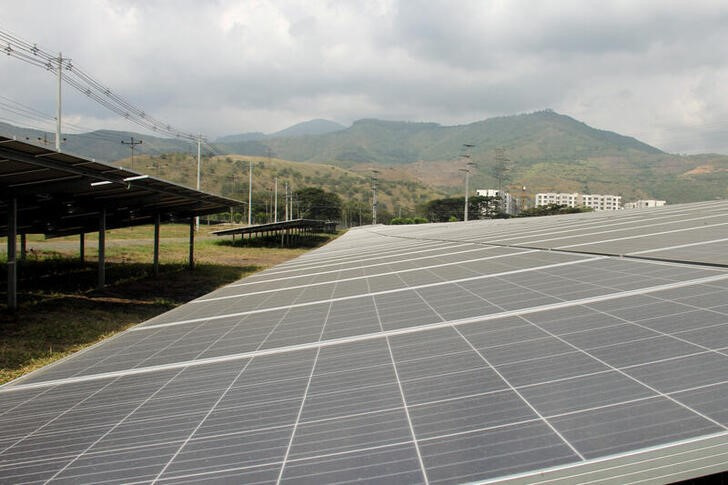By Nelson Bocanegra
BOGOTA (Reuters) - In May, a forum bringing together leaders debating wind and solar development in Colombia's La Guajira province was disrupted by a chorus of passionate opposition.
"La Guajira is not for sale!" exclaimed one attendee, a member of the area's Wayuu Indigenous community, who led the chant with others as the then-energy minister and local officials looked on.
The protest at the University of La Guajira event illustrates the challenges for over a dozen multinationals and the government of leftist President Gustavo Petro, as they seek to turn Colombia away from oil and coal even as a nascent renewables industry faces environmental licensing delays and determined opposition by some Wayuu communities.
More than 50 possible wind and solar projects by companies, including EDP Renewables, Energi, Brookfield Asset Management, AES (NYSE:AES) and Enerfin have been announced in Colombia since 2019, with planned generation of 2.43 gigawatts in wind energy and 0.1 gigawatts in solar.
Though many were meant to be operating this year or last, none are. The companies did not respond to questions.
The tensions come as drought brought by the El Nino weather phenomenon looks set to deplete the production capacity of the hydropower-dependent country, leading to possible shortages and higher charges.
La Guajira - a coastal desert province in Colombia's far northeast - offers high-velocity wind, with few natural obstacles to turbines, as well as an often-blazing equatorial sun.
Some companies - including Italy's Enel (BIT:ENEI) - have indefinitely delayed projects, blaming local protests for hampering billions in investments.
A week-long visit by Petro and his cabinet to the traditionally poor province in late June failed to convince many Wayuu community members, who say companies and officials are not considering how proposed projects could affect their spiritual traditions, livelihoods and property rights - as well as the environment.
"They are projects done behind the backs of the community," said Jose Silva, the director of Nacion Wayuu, a group of 600 Wayuu leaders.
"Authorities, politicians and businessmen sit down to negotiate, not the ancestral owners of the land," he said.
Petro has promised to ensure communities benefit from projects and in some cases even participate in running them.
Silva said his group did not manage to meet with Petro and his cabinet during the visit but that those Wayuu who did were left with "more doubts than certainties."
Enel indefinitely halted construction of its Windpeshi wind park, which was to generate enough energy to power 500,000 homes, in May because of protests it said caused three years of delays and cost overruns of more than $250 million.
Members of a Wayuu group blocked roads, preventing workers from accessing the project for about half of the last three years, Enel said.
But Wayuu groups say they have no choice but to use blockades to stop projects on their lands that they have not approved and that protests are the result of a lack of communication.
"We have managed to unblock some and we want to move all of them ahead," said Petro in July, though he said a goal to bring 6 gigawatts of renewable production online during his term "could have difficulties."
Denmark's ambassador to Colombia Erik Hoeg told Reuters there was "considerable interest" from Danish companies and others from Europe but added: "We are waiting a bit in some cases for clear regulation, for example for offshore wind."
Dialogue must take place with Indigenous communities, Hoeg said, and Colombia should not lose the chance to become an exporter of renewable energy.
REGIONAL CONFLICTS GROW
The situation in La Guajira echoes challenges in Chile, where Indigenous communities are resisting lithium developments, and Mexico, where dozens of projects in wind, solar and other renewables are awaiting environmental permitting.
Wayuu community members say construction threatens trees and wildlife and has damaged grazing areas for hundreds of goats, killing off a top human food source, and violated sacred territory where their ancestors are buried.
Conflicts over projects have caused at least 10 deaths in the communities he represents, Silva added, as fraudulent landowners negotiate with companies instead of actual property holders, sparking violence.
Joanna Barney, a researcher at non-governmental organization Indepaz said she was aware of the deaths associated with conflicts over renewables projects.
Renewables - even if ostensibly more environmentally-friendly - are facing hurdles similar to those confronted by oil and mining companies, long Colombia's top sources of income.
Problems with environmental licensing have also stopped projects debuting on expected timelines, said Alexandra Hernandez, president of the Colombian Renewable Energy Association (SER).
Licenses for two wind farms belonging to Portugal's EDP Renewables were denied by Colombia's environmental authority because it said the company failed to identify potential impacts in each area of the project, including road access, and failed to properly demarcate protected zones.
Wind and solar provide less than 1% - about 300 megawatts - of Colombia's current energy generation. Hydroelectric generation accounts for 70%.
Planned renewable projects could eventually produce 20,000 megawatts, enough electricity for 11 million people, nearly a fourth of the population, says SER, which represents more than 90 companies.

Each megawatt would require between $700,000 and $1 million in investment by companies, taking potential spending on renewables to up to $20 billion nationally. About 65% have pending legal processes and some have been delayed for years.
"The projects aren't operating and it doesn't seem like they will start in the next two years," said Alejandro Lucio of Optima Consultores, which advises renewables companies. "Investors are tired of waiting."